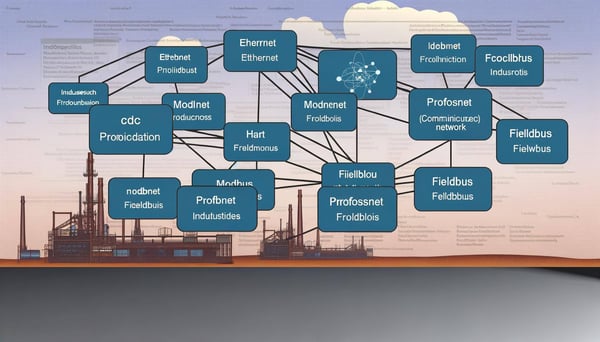
Fundamentals of Modbus
In the world of industrial automation, communication protocols play a pivotal role in ensuring seamless interaction between devices. Among these protocols, Modbus stands out as a time-tested and widely adopted standard. This article delves into the fundamentals of Modbus, exploring its origins, operation, and applications in various industrial settings.
Understanding Modbus: An Overview
Modbus is a communication protocol developed in 1979 by Modicon, a company known for its pioneering role in programmable logic controllers (PLCs). Designed as a simple and robust protocol, Modbus has found its place in numerous industrial applications, from process control to automation.

One of the key attributes of Modbus is its open-source nature. This means that it can be used freely, which has contributed to its widespread acceptance and use. It is a master/slave or client/server protocol, where the master or client initiates data exchanges and the slaves or servers respond to the requests.
Modbus Variants: Modbus RTU and Modbus TCP/IP
Modbus protocol comes in two primary variants: Modbus RTU and Modbus TCP/IP. Modbus RTU (Remote Terminal Unit) is a binary protocol that operates over serial communication channels, either RS-232 or RS-485. It is known for its compact data packets and high-speed communication.
On the other hand, Modbus TCP/IP is a variant of the protocol designed to operate over Ethernet networks. It encapsulates Modbus frames into TCP/IP packets, allowing Modbus communication over long distances and complex networks. This variant is widely used in modern industrial applications due to the ubiquity of Ethernet networks.
How Modbus Works
Modbus Data Model
Modbus uses a simple data model based on a series of registers. These registers store data from the devices connected to the network. There are four types of registers: Discrete Inputs, Coils, Input Registers, and Holding Registers. Each register type serves a specific purpose, and they can store binary or analog values depending on the register type.
Discrete Inputs and Coils are used for binary inputs and outputs, respectively. On the other hand, Input Registers and Holding Registers are used for analog inputs and outputs, respectively. This simple and flexible data model is one of the reasons for the widespread use of Modbus in industrial applications.
Modbus Communication
Modbus communication is initiated by a master or client device, which sends a request to a slave or server device. The request includes the function code, which specifies the type of operation to be performed, and the data address, which specifies the location of the data in the slave device.
The slave device responds to the request by performing the specified operation and sending a response back to the master device. The response includes the function code, the data address, and the data itself. If the operation cannot be performed, the slave device sends an exception response.
Applications of Modbus
Modbus has found widespread use in various industrial applications due to its simplicity and robustness. It is commonly used in process control systems, where it enables communication between control devices and field devices. It is also used in building automation systems, where it facilitates communication between various building systems such as HVAC, lighting, and security systems.
Moreover, Modbus is used in energy management systems, where it allows for the monitoring and control of energy consumption. It is also used in industrial automation systems, where it enables communication between PLCs, human-machine interfaces (HMIs), and other industrial devices.
Conclusion
Modbus is a fundamental protocol in the realm of industrial communication. Its simplicity, robustness, and open-source nature have made it a popular choice for various industrial applications. Whether it's process control, building automation, energy management, or industrial automation, Modbus has proven to be a reliable and effective communication protocol.

As we move towards an increasingly interconnected industrial landscape, the role of robust and reliable communication protocols like Modbus becomes even more critical. By understanding the fundamentals of Modbus, industry professionals can better leverage this powerful protocol to drive efficiency and productivity in their operations.



